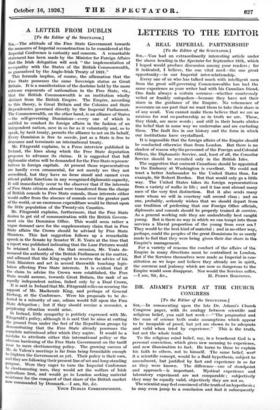LETTERS TO THE EDITOR
A REAL IMPERIAL PARTNERSHIP
[To the Editor of the SPECTATOR.]
SIR,—You had an extraordinarily interesting article under the above heading in the Spectator for September 18th, which I hoped would produce discussion among your readers ; for it indicated, I believe, the one vital need—the one great opportunity—in our Imperial inter-relationship.
Every one of us who has talked much with intelligent men from the great self-governing Commonwealths has had the same experience as your writer had with his Canadian friend. One finds always a certain soreness—whether courteously veiled or frankly outspoken—because they have not their share in the guidance of the Empire. No vehemence of assurance on our part that we want them to take their share is of any avail. You cannot make them believe that we are as anxious for real co-partnership as in truth we are. These, they think, are mere words ; and still in their hearts abides the belief that in some way we undervalue and are excluding them. The fault lies in our history and the form in which our institutions have crystallized.
It is impossible that the foreign affairs of the Empire should be conducted otherwise than from London. But there is no shadow of reason why the personnel of the Foreign and Colonial Offices, the Diplomatic Service, and, least of all, the Consular Service should be recruited only in the British Isles.
The suggestion that eminent Canadians should be appointed to the Embassy at Washington is excellent. We could not want a better Ambassador to the United States than, for example, Sir Robert Borden. But that would only go a little way. The United States takes its foreign representatives from a variety of walks in life ; and it has sent abroad many men of the very first distinction. But it also sends many more whom we will in courtesy call second class ; and no one, probably, seriously wishes that we should depart from our tradition of preferring that our Foreign Office officials, diplomats and consuls should be properly trained de carriere. As a general working rule they are undoubtedly best caught young. But is there no way in which we can tempt into those services a liberal proportion of the young from over sea ? They would be the best kind of material ; and in no other way, perhaps, could the peoples of the great Dominions be so surely made to feel that they were being given their due share in the Empire's management.
For a variety of reasons the conduct of the affairs of the Empire in many directions must be centralized in London. But if the Services themselves were made as Imperial in con- stitution as we hope and believe they already are in spirit, the soreness and jealousy which are now so dangerous to the Empire would soon disappear. Nor would the Services suffer.






















































 Previous page
Previous page